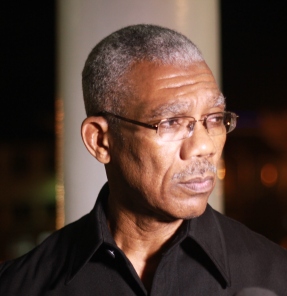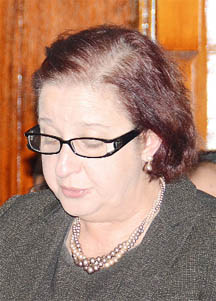‘We just got tired and decided you know, our presence at this point in the debate is of no interest and no concern to the opposition’ –PPP/C Chief Whip Gail Teixeira.

The PPP/C last night walked out of the debate on a motion brought by Opposition Leader David Granger for a National Heritage Commission which would promote national appreciation for the “diverse cultural strains which enrich society” which was eventually passed in their absence.
The walk-out by the government parliamentarians was a first for the ruling party while in power and Granger said that it was “a moment of some astonishment that the government should walk out.”
The PPP/C Chief Whip, Gail Teixeira said that the opposition did not care what the government said or presented. “This was Granger’s motion. It was passed by diktat,” she said. She said that the Heritage Commission was a good idea but there was more that was needed but the opposition wanted to finish it off last night and they decided that their presence at that point did not make much difference. She said that they tried over and over to ask for a deferral of the motion or that it be sent to a special select committee. “We just got tired and decided you know, our presence at this point in the debate is of no interest and no concern to the opposition,” Teixeira said.
In commending the motion to the House, Granger said that he was in contact with Minister of Culture, Youth and Sport, Dr Frank Anthony and he proposed some amendments which Granger agreed to. “There was nothing before me that I didn’t agree to do,” he said, adding that the government just wanted to procrastinate. He underscored the importance of the motion to preserving and protecting the country’s heritage.
Teixeira in her contribution to the debate before the walk-out said that the matter was discussed extensively at Cabinet and they thought that unanimity should have been sought. She said that they did not believe that it was too late to halt the process and have a team meet to discuss the issue. She said that the government supported the initiative but believed that it should be national and unanimous. She said that the motion as drafted was limited in terms of what could be done.
APNU parliamentarian Amna Ally also spoke in favour of the motion and said that the time has come to establish a national heritage and culture commission. She said that the motion was not contentious or vexatious and it was of national importance.
At 10pm, Speaker of the National Assembly Raphael Trotman pointed out that the Standing Orders stipulate that the business of the House should be wrapped up by that time. He said that he believed that attempts should have been made to reach consensus and given what he had heard during the debate, he believed that consensus could be reached.
However, the opposition moved to extend the sitting and finish debate on the motion while the government side moved a counter-motion to continue debate at the next sitting. A division was called and the opposition motion to extend the sitting was passed.
The government parliamentarians then walked out and in their absence, the motion was passed with amendments. Other speakers on the motion were APNU’s Sydney Allicock and the AFC’s Cathy Hughes. Anthony was also scheduled to speak but joined the walkout prior to his turn to speak.
The recital to the motion adverts to the preamble to the Constitution and Article 35 of the Constitution which deal with the celebrating of the cultural and racial diversity of the country.

The recital refers to the indigenous peoples’ observation of Amerindian Heritage Day on September 10 of each year. It also refers to the risings by enslaved Africans in 1763 and 1823 and their subsequent freeing in 1838. Note is also made in the recital of the arrival of indentured labourers from Madeira in 1835, indentured labourers from India in 1838, liberated captive Africans in 1841 and indentured Chinese labourers in 1853.
Pointing out that the state may from time to time, “consider the erection of monuments, the observance of events, the publication of educational and historical texts, films, broadcasts and other educational materials in order to satisfy the various cultural needs of the people of Guyana” and that due recognition should be made of the cultural needs of all Guyanese, Granger’s motion called for a National Heritage Commission.





